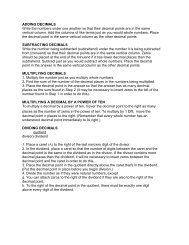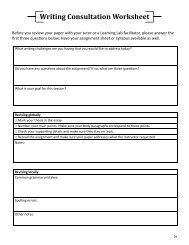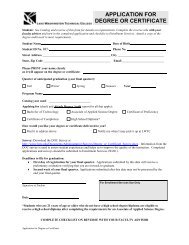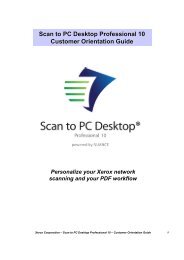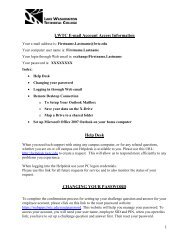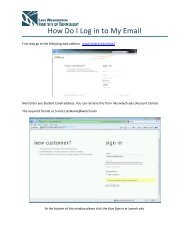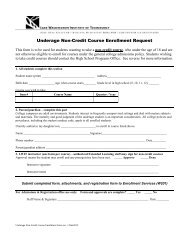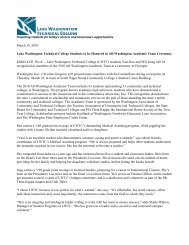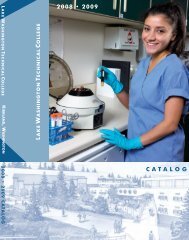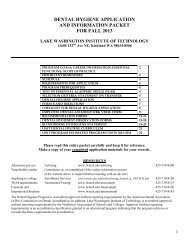2 - Lake Washington Institute of Technology
2 - Lake Washington Institute of Technology
2 - Lake Washington Institute of Technology
You also want an ePaper? Increase the reach of your titles
YUMPU automatically turns print PDFs into web optimized ePapers that Google loves.
Programs <strong>of</strong> Study 2<br />
Diesel & Heavy Equipment Technician<br />
www.lwtech.edu/diesel<br />
DIESEL & HEAVY EQUIPMENT TECHNICIAN<br />
ASSOCIATE IN APPLIED SCIENCE DEGREE<br />
117 CREDITS<br />
Admission Dates: Fall, Winter, Spring, Summer<br />
Program Mission: Diesel & Heavy Equipment Technician<br />
AAS degree educates and mentors students in the latest<br />
technology, equipment, ideals, and fuel systems that<br />
power the diesel and heavy equipment industry today<br />
and in the future both close to home and at locations<br />
worldwide. It prepares students for lifelong learning and<br />
skill development, help students realize their potential<br />
to be successful at their careers and improve our<br />
community, economy and environment.<br />
Diesel & Heavy Equipment Technician AAS degree<br />
students learn how to diagnose problems and perform<br />
repairs on various vehicle components including<br />
engines, fuel, cooling, electrical, electronic, hydraulic,<br />
brake, suspension, undercarriage, power-shift and<br />
drive-train systems in the trucking and heavy equipment<br />
industry. Students will spend their first term training in<br />
a transportation core curriculum. The laboratory area<br />
simulates an industry environment. Students who have<br />
met the course objectives may be placed in a cooperative<br />
work experience to further develop their skills on the job.<br />
Diesel & Heavy Equipment Technician AAS degree<br />
graduates will:<br />
be prepared to obtain an entry-level repair technician<br />
position in their field<br />
perform repairs on various diesel vehicles, vehicle<br />
components and equipment<br />
develop lifelong educational and employment goals<br />
establish an appreciation for life-long learning<br />
be prepared to succeed on the ASE certification and<br />
OEM certification exams<br />
meet minimum competency in eight categories identified<br />
as essential for employability: adherence to policy and<br />
procedure, technical knowledge, skill application, work<br />
planning, quality <strong>of</strong> work, quantity <strong>of</strong> work, interpersonal<br />
skills, oral and written communication<br />
demonstrate advanced skills in: diagnostics, repair and<br />
maintenance, electronics, hydraulics, power train, engines,<br />
pneumatics, undercarriage, brakes and welding.<br />
demonstrate critical thinking, teamwork,<br />
communication, intercultural appreciation, and<br />
technical and information literacy skills<br />
meet Social Science, Humanities, Written<br />
Communication, and Quantitative Reasoning<br />
distribution area outcomes<br />
<strong>Lake</strong> <strong>Washington</strong> <strong>Institute</strong> <strong>of</strong> <strong>Technology</strong> does not<br />
<strong>of</strong>fer every course each quarter. It is the student’s<br />
responsibility to consult the Class Schedule and work out<br />
an individual schedule with an adviser or counselor. Any<br />
developmental coursework a student may be required to<br />
complete may increase the program length.<br />
TRAN 110, 112, 113, and 125 must be taken in the first quarter.<br />
CWEX Cooperative Work Experience may be completed<br />
in the students last 3 quarters <strong>of</strong> training by instructor<br />
permission only.<br />
PROGRAM REQUIREMENTS<br />
TRAN 110 Computer Basics/Transportation Trades. .........2<br />
TRAN 112 Shop & Business Practices. ......................5<br />
TRAN 113 Basic Electrical Systems. ........................4<br />
TRAN 125 Mechanical Principles ..........................5<br />
DHET 122 Welding Applications. ..........................4<br />
DHET 123 Heavy Duty Electrical Systems. ..................4<br />
DHET 124 Electronic Applications. ........................4<br />
DHET 125 Basic Maintenance. ............................3<br />
DHET 131 Engine Principles/Components. .................3<br />
DHET 132 Gasoline/Liquid Propane Gas Systems. ..........3<br />
DHET 133 Diesel Systems. ................................3<br />
DHET 134 Fuel Injection. .................................3<br />
DHET 135 Diagnostics/Adjustments/Emissions. ............3<br />
DHET 211 Hydraulic Fluid Power I .........................6<br />
DHET 213 Hydraulic Fluid Power II. ........................6<br />
DHET 214 Diesel Mechanical Practices. ....................3<br />
DHET 221 Power Trains/Standard. .........................6<br />
continues on next page…<br />
Programs <strong>of</strong> Study<br />
2 0 1 3 - 2 0 1 4 • L A K E W A S H I N G T O N I N S T I T U T E O F T E C H N O L O G Y • C A T A L O G 67



